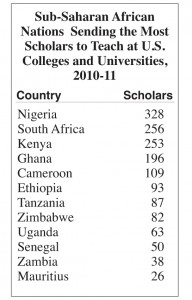 According to new data from the Institute on International Education, in the 2010-11 academic year, there were 115,313 foreign scholars teaching at American colleges and universities. The number of foreign scholars was up slightly from the previous year. More than 83 percent of these foreign scholars are from either Europe or Asia. Only 2,790 or 2.4 percent are from African nations. This is down from 3,800 just three years ago. At that time, scholars from Africa made up 3.3 percent of all foreign professors teaching at U.S. universities.
According to new data from the Institute on International Education, in the 2010-11 academic year, there were 115,313 foreign scholars teaching at American colleges and universities. The number of foreign scholars was up slightly from the previous year. More than 83 percent of these foreign scholars are from either Europe or Asia. Only 2,790 or 2.4 percent are from African nations. This is down from 3,800 just three years ago. At that time, scholars from Africa made up 3.3 percent of all foreign professors teaching at U.S. universities.
 Not unexpectedly, the number of scholars from the Arab nations of North Africa teaching in the U.S. declined significantly after September 11, 2001. But still, more than 33 percent of the African scholars teaching in the United States are from the Arab nations of North Africa. Today there are about 1,850 from sub-Saharan African nations teaching at U.S. colleges and universities. This is down from 2,750 just three years ago.
Not unexpectedly, the number of scholars from the Arab nations of North Africa teaching in the U.S. declined significantly after September 11, 2001. But still, more than 33 percent of the African scholars teaching in the United States are from the Arab nations of North Africa. Today there are about 1,850 from sub-Saharan African nations teaching at U.S. colleges and universities. This is down from 2,750 just three years ago.
Nigeria sent 328 scholars to teach in the U.S., more than any other sub-Saharan African nation. But the number of Nigerian scholars teaching here has dropped by about 25 percent over the past three years. South African ranked second with 256 scholars teaching in the U.S. and Kenya was a close third with 253 professors at American colleges and universities. But both these nations have had a sharp reduction in the number of scholars teaching abroad in the U.S. There are 28 percent fewer faculty from South Africa and 43 percent fewer faculty from Kenya than was the case just three years earlier
Among other sub-Saharan African nations, Ghana and Cameroon were the only other countries to send as many as 100 scholars to teach at U.S. universities. Seven other sub-Saharan African nations sent more than 25 black scholars to the U.S.
There are also 375 scholars from Caribbean nations teaching at U.S. colleges and universities including 103 from Jamaica and 94 from Trinidad and Tobago. In all probability the vast majority of these scholars are Black.












